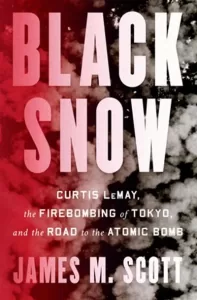“Black Snow; Curtis LeMay, the Firebombing of Tokyo and the Road to the Atomic Bomb” is author James M. Scott’s latest release. In some w ays it is a sequel to his previous book “Rampage” about the battle for Manila. I consider James to be one of the greatest historical writers of our generation.
ays it is a sequel to his previous book “Rampage” about the battle for Manila. I consider James to be one of the greatest historical writers of our generation.
There are many fascinating historical characters presented in this book but principally focuses on Curtis LeMay – one of the Army Air Corps, later Air Force’s most legendary figures.
LeMay was a “problem solver” and developed many of the bombing techniques successfully used in the campaign against Germany. He personally led some of the most dangerous missions of that theatre. He trained his crews relentlessly and held them to high standards. Some of his crews may not have liked him but they all respected him. One said “If LeMay told me two plus two equaled five I would believe him.”
LeMay was appointed to replace Brigadier Haywood Hansell, whom James describes as “a planner, not a predator” to prosecute the bombing campaign against Japan. They would be using the new B-29 Stratofortress, the most expensive weapon system of World War II.
The strategy of high altitude precision bombing employed in the European theatre was not working in the Pacific. Several factors contributed to this issue including the frequency of cloud cover over the targets and the jet stream which would push bombs dropped from high altitudes far off target.
LeMay stripped the bombers of all defensive weapons and ordered them to attack at low level at night. Understandably, many of his crews thought these would be suicide missions but they caught the Japanese completely by surprise. The missions proved devastating, incinerating 15.8 square miles of Tokyo and 267,171 homes, stores and businesses. The blazes were so intense that many of the bombers returned with soot coating their fuselage.
The description Black Snow was quoted by reporter Robert Guillain as he observed the immediate aftermath of the bombings.
James’ next project will closely examine the three days surrounding the atomic bombings of Hiroshima and Nagasaki.
Podcast: Play in new window | Download (Duration: 41:59 — 7.2MB)

